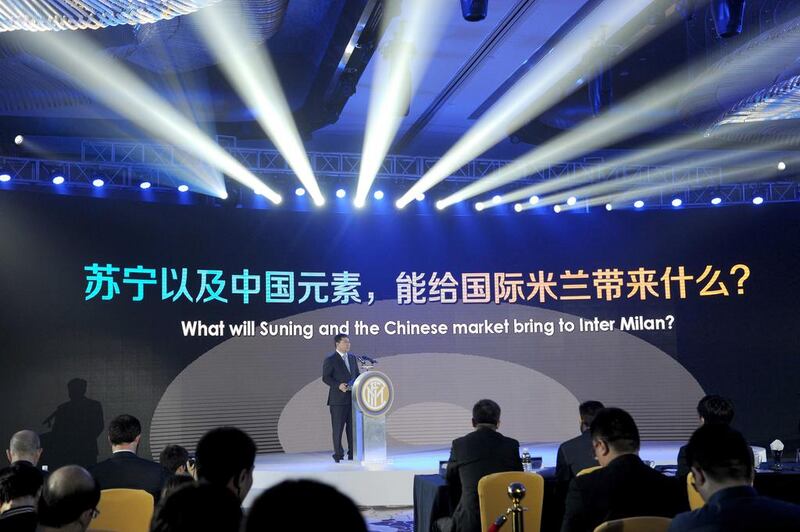London // In the space of a single August day separate Chinese investors purchased the English Premier League (EPL) side West Bromwich Albion and the Italian Serie A club AC Milan.
The former was reportedly priced at £150 million (Dh717m) while the latter deal valued the seven-times Champion’s League winners at £627m.
While the close timing of the two announcements was coincidental, it represents a growing trend for Chinese investors to target European football clubs.
Earlier this year Aston Villa was bought by a businessman from China for £60m despite it having recently been relegated from the EPL. Last year, the Chinese billionaire Wang Jianlin bought a 20 per cent stake in the Spanish La Liga club Atletico Madrid for €45m (Dh184m).
Money from China continues to pour into European football – in June the Chinese retail giant Suning Group purchased a 70 per cent stake in the Serie A side Inter Milan for €270m.
Richard Battle is the senior manager of the Deloitte Sports Business Group and regularly advises clients looking to invest in European football and thinks the Chinese government has helped to increase the Asian nation’s appetite for football.
“A marked increase in the level of interest of Chinese stakeholders in the game has been driven in large part by the Chinese government’s explicit commitment to football,” he says.
“Xi Jinping, the Chinese president, is an ardent football fan and the launch of a 50-point plan for the development of Chinese football has accelerated domestic interest in the game, with one of the stated long-term aims being hosting a Fifa World Cup.”
It might lack the global prestige of the elite European leagues but the Chinese Super League has emerged as a global powerhouse with clubs splashing out huge amounts of cash on player transfer fees and wages to attract established European stars, and not-so-sparkling players.
The Argentinian winger Ezequiel Lavezzi reportedly earns US$16.8m per year playing for Hebei China Fortune, making him the fifth-highest paid footballer in the world. Last year Guangzhou Evergrande paid Atletico Madrid $45.8m to acquire the services of Jackson Martinez, an out-of-form Colombian striker who had struggled to make any impact in La Liga.
Sky Sports recently secured the rights to broadcast the Chinese Super League in the United Kingdom but Chinese investors are still more attracted to European football clubs than the ones in their local league. Mr Battle thinks there are a number of reasons for this: “The ownership of a successful European club has long been seen by many as a global trophy asset, providing owners with an enhanced business profile and access to important relationships.
“This, considered with the additional political goodwill towards football within China, will no doubt further increase the attractiveness of Europe’s clubs to Chinese investors.”
The EPL currently has more than 2.5 million followers on Sina Weibo, the social network which is frequently referred to as China’s answer to Twitter. That also makes English clubs a particularly attractive proposition to Chinese investors according to Mr Battle. “The Premier League also has an appeal within China that would allow investors to leverage their overseas investment domestically,” he says.
“An investment in a club can be aligned with the growth of the sport as a whole in China via the sharing of knowledge, expertise and best practice as well as obvious commercial opportunities.”
Last year a Chinese consortium bought a 13 per cent stake in Abu Dhabi-owned Manchester City for £265m. The club’s desire to gain a foothold in China lay behind the deal, according to the chairman Khaldoon Al Mubarak. “In China, the exponential growth pathway for the game is both unique and hugely exciting. We worked hard to find the right partners and to create the right deal structure to leverage the incredible potential that exists in China, both for CFG [the City Football Group] and for football at large,” Mr Al Mubarak says.
He gives a glimpse into the symbiotic nature of these deals; European football clubs want the sort of local experience and expertise that can help them to break into the potentially lucrative Chinese market while the investors are after a prestigious piece of sporting real estate.
Football’s financial records are being broken every month. Manchester United recently paid £89m for Paul Pogba while the EPL is set to raise an unprecedented £5.13 billion from the global sale of television rights for the new season that kicked off on Saturday.
The multi-millionaires pumping money into the world’s most revered domestic leagues are motivated by both money and prestige.
Football remains an extremely attractive proposition for Chinese investors and Ruigang Li, a spokesman for the consortium which purchased a 13 per cent share in City, lays out the reasons why: “Football is now at a fascinating and critical stage of development in China.
“We see unprecedented growth opportunities in both its development as an industry, being China’s most watched sport, and its inspirational role bringing people of all ages together with a shared passion.”
A group of Chinese investors is currently in advanced talks to buy the newly promoted EPL side Hull City and the country’s fascination with football means even more money is likely to be pumped into European clubs over the coming months.
business@thenational.ae





